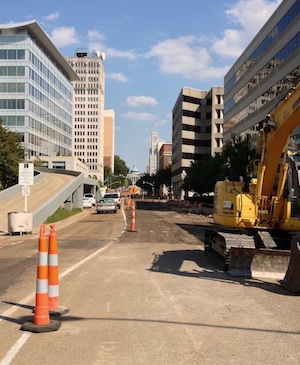"Oh God, the heathen have come into your inheritance; they have profaned your holy temple." Psalm 79:1
"I helped create this," stated Reverend Ed King as we ate lunch at the Mayflower Cafe in Jackson, Mississippi. We were talking about what it was like to walk downtown the main street in Jackson, Mississippi t that leads up to the State Capitol. This street flanked on all sides by what used to be very powerful white mainline Protestant Christian churches -- First Presbyterian, First Baptist, Galloway United Methodist...
"Do you feel something? Do memories flood back?" I asked. Fifty years before this street was filled -- marches, sit-ins, police violence, torture... now silent and mostly deserted. As soon as white power structure was given a huge blow by the hard work and sacrifice of many... the main streets of Jackson were deserted.
View of the Mississippi State Capital down North Congress Street in Jackson, 9/17/2013
As we ate our lunch that hot afternoon, construction crews were rehabilitating the road, trying to implement another attempt at revitalization. The Mayflower Cafe is one of only a handful of business actually open.
Reverend Ed King has been in Jackson, Mississippi since 1963 when he came to serve as a chaplain at Tougaloo College. He was the first white minister to take this position in an all black college. This minister of the Civil Rights Movement was instrumental in organizing a church protest campaign in which black and white students would attempt to enter the white powerful churches mentioned at the beginning of this post -- "to confront Christians where they are vulnerable -- their faith" to paraphrase Reverend King.
If the call of the church is to bring all humans to Christ, how can any church justify turning people away who have come to worship in peace?
United Methodists, Presbyterians, Baptists... Protestant Christians called the police... students were handcuffed and jailed when they attempted to kneel down to pray outside of the doors that shut them out of Christian fellowship.
Yes. This was a thing... and it was a thing less than fifty years ago. But now Jackson streets are quiet. "I helped create this," Reverend King says.
So what has been created? What do we make of the silent streets?
Well, on the one, hand my daughter and I can sit together without incident in downtown Jackson. Her brown skin against my white skin is not grounds for refusing us service -- or worse -- any longer. On the other hand, the cry of civil rights struggle is drowned out by the comforting seductions of a wishful post-racial mindset.
For the over the past decade my church, the United Methodist Church (UMC), has advertised
Yet, if we are to purify the profaned temple -- the temple filled with those that not less than 50 years ago would choose to arrest rather than welcome people of color into its doors, we will need more than a nice slogan. As we stand now... 50 years later the UMC remains
, churches remain segregated and actual diversity (i.e. people of color and whites, not only worshiping, but leading churches together) elusive.
Oh God, the heathen have come into your inheritance; they have profaned your holy temple.
Like Reverend King the struggles and shouts for justice will need to well up in us on a regular basis. We need to teach ourselves and our children about the sacrifices, the lives lost... We need to repent of taking too much solace in the silence streets.
Support HuffPost
Our 2024 Coverage Needs You
Your Loyalty Means The World To Us
At HuffPost, we believe that everyone needs high-quality journalism, but we understand that not everyone can afford to pay for expensive news subscriptions. That is why we are committed to providing deeply reported, carefully fact-checked news that is freely accessible to everyone.
Whether you come to HuffPost for updates on the 2024 presidential race, hard-hitting investigations into critical issues facing our country today, or trending stories that make you laugh, we appreciate you. The truth is, news costs money to produce, and we are proud that we have never put our stories behind an expensive paywall.
Would you join us to help keep our stories free for all? Your contribution of as little as $2 will go a long way.
Can't afford to donate? Support HuffPost by creating a free account and log in while you read.
As Americans head to the polls in 2024, the very future of our country is at stake. At HuffPost, we believe that a free press is critical to creating well-informed voters. That's why our journalism is free for everyone, even though other newsrooms retreat behind expensive paywalls.
Our journalists will continue to cover the twists and turns during this historic presidential election. With your help, we'll bring you hard-hitting investigations, well-researched analysis and timely takes you can't find elsewhere. Reporting in this current political climate is a responsibility we do not take lightly, and we thank you for your support.
Contribute as little as $2 to keep our news free for all.
Can't afford to donate? Support HuffPost by creating a free account and log in while you read.
Dear HuffPost Reader
Thank you for your past contribution to HuffPost. We are sincerely grateful for readers like you who help us ensure that we can keep our journalism free for everyone.
The stakes are high this year, and our 2024 coverage could use continued support. Would you consider becoming a regular HuffPost contributor?
Dear HuffPost Reader
Thank you for your past contribution to HuffPost. We are sincerely grateful for readers like you who help us ensure that we can keep our journalism free for everyone.
The stakes are high this year, and our 2024 coverage could use continued support. If circumstances have changed since you last contributed, we hope you’ll consider contributing to HuffPost once more.
Already contributed? Log in to hide these messages.

